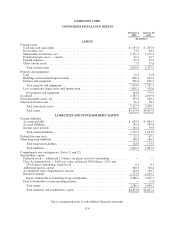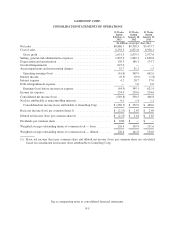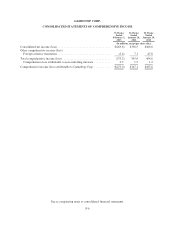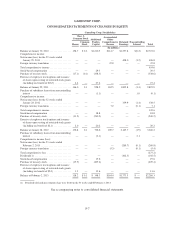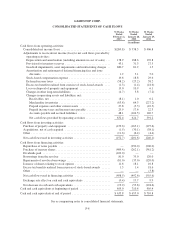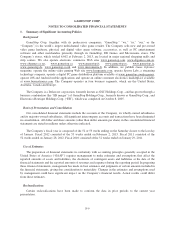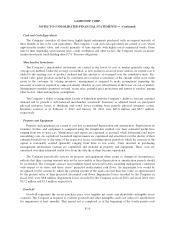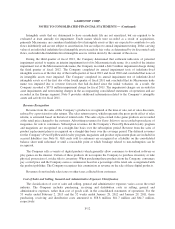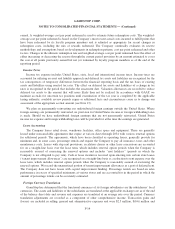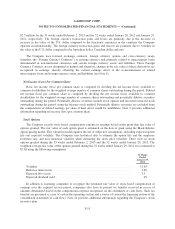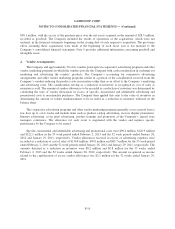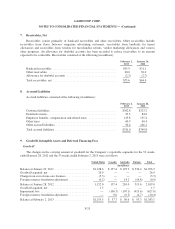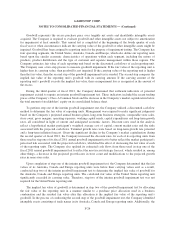GameStop 2012 Annual Report Download - page 89
Download and view the complete annual report
Please find page 89 of the 2012 GameStop annual report below. You can navigate through the pages in the report by either clicking on the pages listed below, or by using the keyword search tool below to find specific information within the annual report.GAMESTOP CORP.
NOTES TO CONSOLIDATED FINANCIAL STATEMENTS — (Continued)
earned. A weighted-average cost per point redeemed is used to estimate future redemption costs. The weighted-
average cost per point redeemed is based on the Company’s most recent actual costs incurred to fulfill points that
have been redeemed by its loyalty program members and is adjusted as appropriate for recent changes in
redemption costs, including the mix of rewards redeemed. The Company continually evaluates its reserve
methodology and assumptions based on developments in redemption patterns, cost per point redeemed and other
factors. Changes in the ultimate redemption rate and weighted-average cost per point redeemed have the effect of
either increasing or decreasing the reserve through the current period provision by an amount estimated to cover
the cost of all points previously earned but not yet redeemed by loyalty program members as of the end of the
reporting period.
Income Taxes
Income tax expense includes United States, state, local and international income taxes. Income taxes are
accounted for utilizing an asset and liability approach and deferred tax assets and liabilities are recognized for the
tax consequences of temporary differences between the financial reporting basis and the tax basis of existing
assets and liabilities using enacted tax rates. The effect on deferred tax assets and liabilities of a change in tax
rates is recognized in the period that includes the enactment date. Valuation allowances are recorded to reduce
deferred tax assets to the amount that will more likely than not be realized. In accordance with GAAP, we
maintain accruals for uncertain tax positions until examination of the tax year is completed by the applicable
taxing authority, available review periods expire or additional facts and circumstances cause us to change our
assessment of the appropriate accrual amount (see Note 13).
We plan on permanently reinvesting our undistributed foreign earnings outside the United States. Where
foreign earnings are permanently reinvested, no provision for United States income or foreign withholding taxes
is made. Should we have undistributed foreign earnings that are not permanently reinvested, United States
income tax expense and foreign withholding taxes will be provided for at the time the earnings are generated.
Lease Accounting
The Company leases retail stores, warehouse facilities, office space and equipment. These are generally
leased under noncancelable agreements that expire at various dates through 2034 with various renewal options
for additional periods. The agreements, which have been classified as operating leases, generally provide for
minimum and, in some cases, percentage rentals and require the Company to pay all insurance, taxes and other
maintenance costs. Leases with step rent provisions, escalation clauses or other lease concessions are accounted
for on a straight-line basis over the lease term, which includes renewal option periods when the Company is
reasonably assured of exercising the renewal options and includes “rent holidays” (periods in which the
Company is not obligated to pay rent). Cash or lease incentives received upon entering into certain store leases
(“tenant improvement allowances”) are recognized on a straight-line basis as a reduction to rent expense over the
lease term, which includes renewal option periods when the Company is reasonably assured of exercising the
renewal options. We record the unamortized portion of tenant improvement allowances as a part of deferred rent.
The Company does not have leases with capital improvement funding. Percentage rentals are based on sales
performance in excess of specified minimums at various stores and are accounted for in the period in which the
amount of percentage rentals can be accurately estimated.
Foreign Currency Translation
GameStop has determined that the functional currencies of its foreign subsidiaries are the subsidiaries’ local
currencies. The assets and liabilities of the subsidiaries are translated at the applicable exchange rate as of the end
of the balance sheet date and revenue and expenses are translated at an average rate over the period. Currency
translation adjustments are recorded as a component of other comprehensive income. Transaction gains and
(losses) are included in selling, general and administrative expenses and were $2.5 million, $(0.6) million and
F-14


